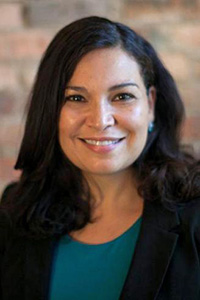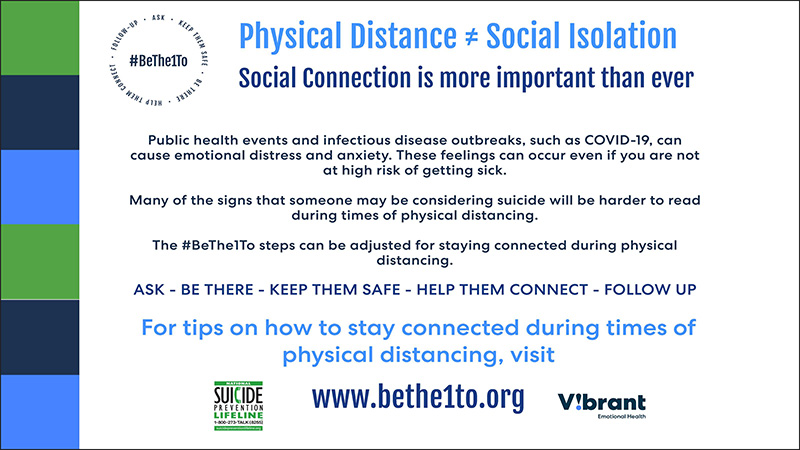Vibrant Emotional Health provides clinical case management and crisis intervention services to young men of color (YMOC) in The Fellowship Initiative, a college attainment program for YMOC in New York City, Chicago, Dallas, and Los Angeles, funded and operated by the JPMorgan Chase Foundation. Our goals are to increase awareness of the emotional and mental health needs of YMOC, promote anti-racism, and offer resources for successful engagement of youth. This article draws from our work and outlines some of the social determinants that impact help-seeking behaviors in young men of color. We include information about how we mitigate these challenges and identify where advocacy is needed.

Lisa Furst, LMSW, MPH

Hilda Marie, MA
Although YMOC face multiple risk factors for mental illness, they are less likely than white youth to seek mental health services1. Suicide is cited as the third leading cause of death for Black males, ages 15-242. This sobering statistic is a call to action for youth-serving professionals; despite our best efforts, YMOC struggle but are not seeking help. We must identify the barriers to help seeking if we are to prevent YMOC from falling through the cracks.
There are several barriers to help-seeking for YMOC:
- Cultural values and rigid masculinity norms discourage YMOC’s emotional expression
- Racist stereotypes of YMOC as invulnerable prevent professionals from recognizing their emotional struggles
- Providers’ unconscious biases are perceived by YMOC and deter them from self-disclosure and help-seeking
- Historical racism and continued acts of violence towards YMOC create mistrust and unsafety
- Communities of color continue to lack access to affordable and quality mental health services
Systemic Racism
The YMOC of TFI are not strangers to racism. An informal poll to assess the number of students who have experienced racial profiling typically leads to more than half of YMOC raising their hands. Many YMOC we encounter have been recipients of “The Talk” at an early age. The Talk involves explicit instructions for Black and Brown boys about how to behave around white people and avoid being targeted, arrested, and shot by police. Parents report being heartbroken to explain to their innocent children that their lives are at risk simply because of their race, yet The Talk is so normalized that it is a rite of passage. Most cultures mark a child’s transition to adolescence with celebration; the families of YMOC must issue a terrifying warning for survival.
Fear of being a target of racism deters YMOC from seeking mental health services. Families of YMOC who call 911 for psychiatric emergencies worry their loved one will be shot by officers who lack adequate mental health awareness. A recent study indicated that teachers suspend boys of color at four times the rate of white boys for the same misbehaviors3. In another study, police officers reported they perceive Black boys as “less innocent” and older, leading them to justify using violence4. These distorted perceptions reinforce mistrust of systems that have historically betrayed YMOC and prevents help-seeking.
Media outlets promote racism through negative portrayals of YMOC as violent and focusing on athletic skills over their intellectual and emotional lives. Social media is a double-edged sword; it promotes awareness of issues that impact YMOC but increases the risk of vicarious trauma via images conveying their lives are disposable. The current sociopolitical environment, resurgence of white supremacy and anti-immigrant sentiments increase YMOC’s risk of mental illness and heighten their sense of unsafety.
Work, Housing, and Food Insecurities
Historically, Black and Indigenous Persons of Color (BIPOC) face disproportionate levels of economic, career and housing disparities. Inequities in legal, educational and health care systems compound these issues. Quality medical/mental health care services are not easily accessible or lack cultural competence to recognize the unique emotional needs of YMOC. With the COVID-19 pandemic, recent political upheaval, and social unrest, YMOC face additional layers of stressors, including unemployment, homelessness, and bereavement.
Health and Mental Health Disparities
The physical and emotional health of BIPOC are directly impacted by their environments and quality of life. Impoverishment, homelessness and unemployment elevate stress levels, and inadequate nutrition increases health risks. The communities who most need medical and behavioral healthcare services often lack these very resources, as the disproportionate death rates of Black and Latinx men from COVID-19 and a combination of pre-existing health conditions attest.
It can be challenging for YMOC to access mental health services in their communities. Waiting lists for treatment in public clinics can lead to hospital emergency room visits as a gateway to rapid treatment. Given the high risk of exposure to COVID-19 and overtaxed health workers at hospitals, this option is no longer viable. Local clinics may provide services and accept insurance, but staff turnover may be high or YMOC may be afraid of encountering people they know. Fear of being labeled as “mentally ill” and perceived as “weak” prevents YMOC from disclosing symptoms to loved ones. As children they repeatedly are told that “boys don’t cry” and to “man up” but this repression contributes to disengagement with their feelings. In the absence of resources and outlets for emotional pain, YMOC may engage in destructive behaviors, including self-medicating with drugs and activities increasing the risk of criminal justice system involvement5.
Solutions
Although we may not perceive ourselves as perpetrators of injustice and racism, change only takes place when we identify our biases and practices perpetuating inequity and injustice, and work to correct them. A compassionate, culturally competent, respectful approach enables YMOC to feel safe, share thoughts and feelings and seek help when needed. It is our professional obligation and moral duty to promote safety for YMOC and engage them about their concerns. During the height of the pandemic and Black Lives Matter protests and rioting, alumni from TFI convened to process the events that were directly impacting them. When asked what they wished others would see in them, besides their skin color, their responses were simple and heartbreaking: to be seen for their strength, resilience, kindness, sense of humor and achievements and to be treated as if they belong. The YMOC in this discussion were stellar college students and shining examples of success, yet reported that they are viewed as a threat to society for no other reason than their skin color.
Our strengths-based and culturally competent approach has resulted in immensely rewarding and healing experiences for YMOC and our staff. The following tools have been effective in building trust and engaging YMOC:
- Communication with balanced expectations: YMOC may not be accustomed to openly sharing feelings and being vulnerable. It will take some time before conversations flow.
- Meet YMOC where they are, literally and figuratively: engage them in places that feel safe, including home, a local park or café or via text and video conference. Expect initial hesitation and ambivalence.
- Assume YMOC want and need to discuss their feelings but need time to build trust.
- Demonstrate genuine curiosity about their lives, passions, and interests. These are all safe starting points for conversations.
- Recognize that YMOC express emotions and seek help in ways that aren’t always obvious. Anger, apathy, silence, hypermasculinity and acting-out may be cries for help. Anger can be more easily accessed but may mask sadness, worry and fear.
- Incorporate culturally diverse activities. Opportunities to share different foods, fashions, and cultural traditions helps youth feel validated and seen.
- Promote positive images of YMOC by celebrating their accomplishments and countering negative media portrayals through highlighting the BIPOC successes.
- Be an ally; stand up for justice and call out biased and racist actions, whether they happen in the presence or absence of YMOC, including those within your own organization or program.
- Invest in YMOC and their families with advocacy. Fight for the on-site presence of mental health providers in public schools and pursue grants that enable agencies to fund quality mental health services in underserved communities.
- Recognize that issues that do not seem overtly related to mental health, such as healthcare, education, housing, economic opportunity, and others directly influence mental and emotional health. Broaden your concept of “mental health advocacy” to include active engagement on these issues. Engage elected officials on the local, state and Federal level to address inequity and injustice. Join coalitions to amplify these demands.
As we continue to support communities of color and their healing processes, the following questions for ourselves and our organizations serve as ongoing reminder of our commitment to the wellbeing of YMOC:
- Do biases—conscious or otherwise—influence how I perceive and interact with YMOC?
- Do we provide culturally competent services to YMOC?
- Have we created a safe enough space for YMOC to express their emotions and seek help?
- Are we aware of how YMOC differ in their emotional expression and help-seeking behaviors?
- What can we do to promote anti-racism?
The fight for racial justice may seem daunting. The factors that impact the ability of YMOC to seek help are many, and progress and change can be slow – yet it is attainable with our continued commitment and hard work.
Hilda Marie, MA, is Program Director of The Fellowship Initiative Program and Lisa Furst, LMSW, MPH, is Assistant Vice President, of the Center for Policy, Advocacy and Education, at Vibrant Emotional Health.
References
- Jon-Ubakuco, N. & Champion, J.D. (2019). Perceived Mental Healthcare Barriers and Health-seeking Behavior of African American Caregivers of Adolescents with Mental Health Disorders. Issues in Mental Health Nursing, 40 (7), 585-592. doi:10.1080/01612840.2018.1547803
- Centers for Disease Control and Prevention. WISQARS. Leading Causes of Death Reports, 1981- 2017. https://webappa.cdc.gov/sasweb/ncipc/leadcause.html
- Jarvis, A & Okonofua, J.A. School Deferred: When Bias Affects School Leaders. Social Psychological and Personality Science, 11 (4), 492-498. https://journals.sagepub.com/doi/abs/10.1177/1948550619875150
- Goff, P.A., Jackson, M.C., Lewis Di Leone, B.A, Culotta, C.M. & DiTomasso, N.A. (2014). The Essence of Innocence: Consequences of Dehumanizing Black Children. Journal of Personality and Social Psychology, 106 (4), 526 –545. http://dx.doi.org/10.1037/a0035663
- Williams R. (2015). Addressing Mental Health in the Justice System. NCSL Legisbrief, 23(31),1-2. PMID: 26328281





